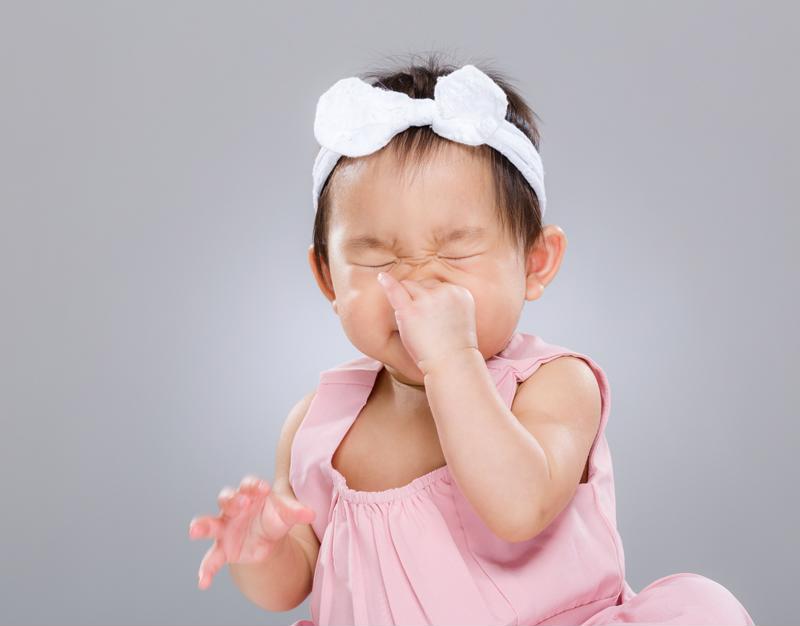Do allergies run in your family? Unfortunately, your baby might have them, too. But don’t worry; as long as you know what to look for, you should be able to manage reactions with no problem.
Understanding seasonal allergies in babies
Babies usually don’t show signs of seasonal allergies until their early school years, but symptoms can show up as young as age 2. They can occur during every season, although they usually let up during winter. The most common seasonal allergens are:
- Spring: Tree pollen, mostly from birch, cedar, maple, oak and pine.
- Summer: Grass pollen, mostly from Bermuda, brome, orchard, rye and Timothy.
- Fall: Weed pollen, mainly ragweed, nettle, chenopod, sage and plantain.
How do I tell the difference between baby allergies and a cold?
At first, colds and allergic reactions look a lot alike. Symptoms of allergies include:
- Dark under-eye circles.
- Itchy, runny nose.
- Congested, stuffy nose.
- Itchy skin.
- Itchy, watery or swollen eyes.
- Headache.
- Sore throat.
- Ear pain.
- Trouble sleeping through the night.
- Fatigue.
- Itchy throat and roof of mouth.
- Difficulty breathing.
If your child says she has the last symptom, contact a doctor immediately just to be on the safe side.
As you might have noticed, many of these symptoms are the same as a cold. To help you tell the difference, look for these signs:
- Symptoms last for more than a few weeks.
- Symptoms don’t react to over-the-counter or prescribed cold medication.
- Baby doesn’t have a fever.
- Symptoms occur around the same time every year.
- Seasonal allergies run in your family.
These are all indicators that what your baby has could be allergies, not a cold.
 If cold symptoms don’t clear up after a few weeks, your baby might actually have allergies.
If cold symptoms don’t clear up after a few weeks, your baby might actually have allergies.Understanding food allergies
True food allergies are quite rare in babies; most, simply have food sensitivities. Moms can usually spot food allergies during breastfeeding, as baby will consume the allergen through mama’s milk. Many allergies take a while to develop, so symptoms might not show the first time baby ingests an allergen. When introducing a new food that might trigger a reaction, watch your baby closely for the following two hours.
Signs of an allergic reaction include:
- Hives.
- Rashes.
- Swelling.
- Itchy skin.
- Vomiting.
- Diarrhea.
And yes, these symptoms can show during breastfeeding, so observe what you eat to see if anything you ingest triggers an allergic reaction. Common allergens or foods that trigger sensitivities include:
- Eggs.
- Peanuts.
- Tree nuts.
- Soy.
- Fruits.
- Wheat or gluten.
- Dairy or cow’s milk (check your baby formula!).
Other allergies
Food and pollen are the most common allergies you’ll come across, but here are some others to keep an eye out for:
- Bugs. Bites and bee stings are uncomfortable but aren’t always allergies. Look for extreme swelling, hives in areas other than the site of the bite and trouble breathing.
- Sunscreen, detergent, fragrance and other topical allergens. Babies with sensitive skin are particularly susceptible to the chemicals found in many home and health products. Switch to fragrance-free products designed for sensitive skin, and ask your pediatrician for recommendations.
- Penicillin. Most babies are actually sensitive, but regardless of whether you suspect an allergy or not, consult your pediatrician if your baby reacts to this medication.
- Pets and pet dander. Symptoms include watery eyes, runny nose, coughing and skin reactions when around pets or pet hair. That said, exposing your child to animals at a young age could reduce the possibility of a pet allergy developing.
Baby allergy testing
Allergic symptoms occur when a baby’s immune system aggressively reacts to a specific trigger by producing an antibody called IgE. This antibody marks the difference between an allergic reaction and a sensitivity, and it’s what allergists test for when looking at your baby.
There are two ways to test for allergies:
- Skin prick test: Baby receives a small amount of the suspected allergen in the top layer of the skin. Results come within 15 to 20 minutes.
- Blood test: A doctor draws blood after exposure to an allergen to measure IgE.
Treating baby allergies
Many allergies, including egg, wheat and dairy, tend to disappear as your child grows older. Others persist, but don’t worry. There are many steps you can take to alleviate the symptoms:
- Use an antihistamine or prescription medication to control side effects.
- Try immunotherapy to expose baby to small amounts of the allergen to build immunity.
- Avoid trigger substances as best as possible.
- Inform other caretakers of allergies.
- Ask your doctor to refer you to a pediatric allergist.
- Create an emergency plan which may include an EpiPen.
As long as you stay prepared, managing your baby’s allergies shouldn’t be a problem.
